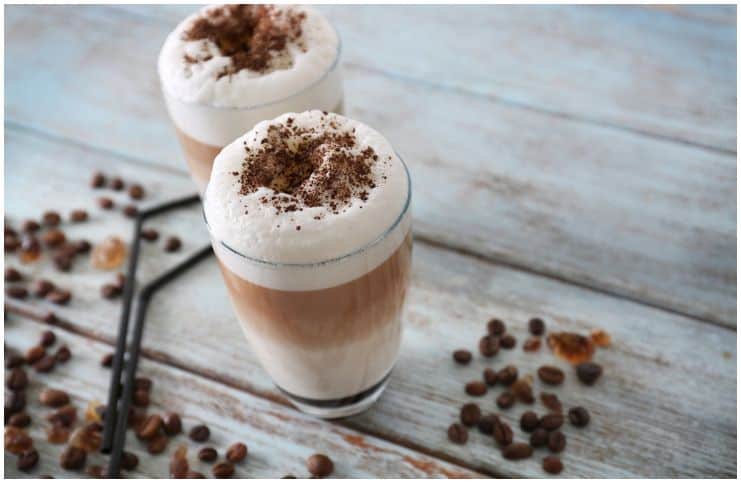The macchiato is a key element of Italian coffee culture. It is basically an espresso with a small amount of foamed milk on top.
In Italian, macchiato means “spotted” or “stained,” hence, the literal translation of caffe macchiato is ”coffee with a spot of milk” or “stained coffee.”
Nutritional Profile
For a small macchiatto (12 oz) with non-fat milk: calories – 130, carbohydrates – 35g, sodium – 125mg, dietary fiber – 0g, protein – 7g, sugars – 36g, vitamin C – 2%, vitamin A – 8%, calcium – 23%, and vitamin D – 19%.
Health Benefits
Bone Health
Calcium forms 2 percent of total body weight in a human adult. It is found in high volumes in the human body as deposits in the teeth and bones. However, each day we lose this essential mineral through our nails, skin, sweat, hair, feces, and urine, but the human body cannot produce new calcium.
In addition, the muscles, heart, and nerves need this mineral to function correctly as well as the body needs it to maintain and build healthy bones. In old age, this mineral becomes even more important since the degeneration of cells is more frequent compared to the regeneration of cells.
Vitamin D
This vitamin refers to a group of related fat-soluble vitamins that are crucial for good health throughout our lives. Perhaps the most significant benefits of vitamin D are regulating the absorption of phosphorus and calcium and assisting the immune system to function normally by supporting the “Killer cells,” as these are essential for seeking out and destroying harmful pathogens.
Moreover, according to studies, sufficient vitamin D levels in adulthood may considerably lower the risk for various types of cancer, such as – breast, colon, prostate, and ovarian. Also, having adequate levels of vitamin D is essential for neurological health because there is a strong association between neurodegenerative disorders, like – Alzheimer’s disease, and a deficiency of this vitamin.
Eye Health
Vitamin A is a fat-soluble vitamin which works as a powerful antioxidant. It boosts the human body’s immunity against numerous types of infections by increasing the lymphocytic responses against disease-causing antigens.
In combination with other antioxidant vitamins, vitamin A has a central role in lowering the risk of macular degeneration, especially among seniors. More importantly, research has concluded that it can fight acne and eczema and improve overall skin health since it is involved in the production of collagen.
A deficiency of this vitamin is common in developing countries; however, it is quite rare in the US. Night blindness is considered to be one of the first signs of deficiency as well as brittle hair and nails, scaly skin, low immunity, and poor growth.
Side Effects Of Caffeine
These drinks contain caffeine, a powerful stimulant that people commonly consume too much. Adverse health effects include – jitteriness, insomnia, irritable bowel syndrome, diuresis, nervousness, headaches, anxiety disorder, restlessness, diarrhea, high blood pressure, and heart disease.
Furthermore, the levels of the stress hormone adrenaline are raised by caffeine and remained elevated at bedtime even when the last coffee was consumed at lunchtime, according to a study from Duke University Medical Centre, USA.
Caffè Latte

It is a hot beverage that usually contains caffeine, where steamed milk is added to espresso and then topped with milk foam. A latte has a ratio of 1/3 espresso and 2/3 milk.
Latte is the Italian word for ”milk,” and this term was 1st used in English in 1867 by William Dean Howells, according to the Oxford English Dictionary.
Nutritional Profile
For a small caffè latte (12 oz) with non-fat milk: calories – 100 (418 kJ), cholesterol – 5mg (2%), carbohydrates – 15g (5%), sugars (14g), dietary fiber – 0g, calcium – 350mg, and protein – 10g.
Health Benefits
A Source Of Calcium
Calcium is probably the most important mineral in the human body. It has been recognized to play a significant role in the transmission of nerve impulses, and sufficient dietary intake of this mineral can lower the risk of high blood pressure, cardiovascular diseases, and osteoporosis.
Hair, Skin, and Muscle Repair
Proteins are a group of biological compounds that are present in every live organ, cell, and tissue of the human body – meaning that protein is needed to keep the blood circulating, muscles repairing, skin regenerating, and bones healthy.
More importantly, protein makes up the hemoglobin which carries oxygen in the blood as well as the enzymes which power various chemical reactions. Lastly, recent research has established that a diet high in protein has numerous health benefits for metabolic health.
Note
Consuming a few caffè lattes per day may lead to obesity since the sugar and milk in this drink make you gain weight.
Bottom Line – Macchiato vs Latte
In our opinion, caffe latte is worse for your health since it has more milk. For instance, milk and dairy products contain lactose, a sugar which can be difficult for people with lactose intolerance (approximately 75 percent of the world’s population) to digest, resulting in symptoms, including – nausea, cramps, bloating, gas, and diarrhea.
Also, both drinks have no dietary fiber, and consuming sugar with no dietary fiber raises glycemia levels faster. Lastly, our advice is to use these drinks sparingly, or even better, skip them altogether.
READ MORE: Measles vs Chicken Pox
References https://www.starbucks.com/menu/drinks/ https://www.starbucks.com/menu/drinks/
